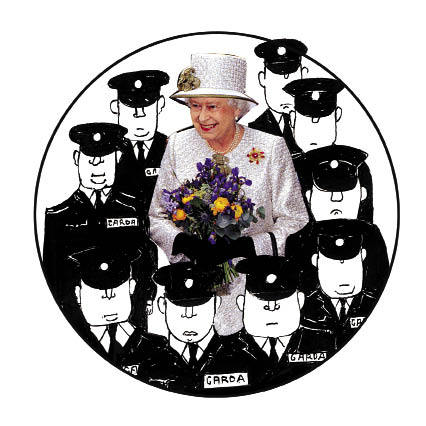You could not mistake the atmosphere in Dublin this week: the state visit of the Queen and Prince Philip has had the full panoply of a historic occasion. It was obvious that the Irish state was wholeheartedly committed to its success, with the most formal protocols in place. Both David Cameron and William Hague have accompanied the Queen for part of the trip, which is highly unusual. The Queen agreed to visit locations associated with those who rose against the Crown — the Garden of Remembrance in Parnell Square — and showed a graceful sense of respect. It has been impressive and even moving. Yet it was also sad — at least in Dublin. Because there is a small but extremely violent minority of dissenters, Dublin city was eerily empty of people. Security barriers blocked off all the main thoroughfares. The desolation of the city streets enhanced, in a way, the beauty of the buildings. Strange to think that hardly a generation ago there were Irish politicians who wanted to knock down Georgian Dublin because it was ‘ancien regime’, and fill the spaces with concrete car parks. Thanks to the wonderful Desmond Guinness (Max Mosley’s half-brother), most of Georgian Dublin was saved, and it looked especially glorious as the royal party sped by.
It is always a matter of controversy when an important visitor comes to town: who gets invited to the various swell receptions and who doesn’t. There has been some grumbling that the focus has been either on the political class or on celebrities, though it was sweet to see national treasure Edna O’Brien, who was 80 this year, and Rachel Allen, the delightful chef from Ballymaloe, appear at the President’s lunch for the Queen, along with the likes of John Hume and David Trimble. But there was some feeling that the British ambassador, Julian King, might have invited to his soirée some who really did make a solid contribution to advancing Anglo-Irish understanding, and of rescuing from history those Irishmen and women who had also served the Crown. Kevin Myers, for instance, almost single-handedly brought to light the Irishmen in the 1914–18 war who were, until the 1990s, sidelined by Irish official history. But he was not invited. Eoghan Harris, who has written extensively about the Protestants of West Cork and how badly they were treated, was also omitted, as were the peace campaigners Chris Hudson MBE and Barbara Fitzgerald CBE. I realise that when you’re giving a party, there are regretful omissions. But Myers, especially, deserves honour for the work he has done and I suggest the Royal Irish Academy make him a Fellow forthwith.
The pop singer Morrissey, in the know-nothing tradition of his ilk, has criticised the Queen for not having intervened to save the hunger striker Bobby Sands’s life. As if she could have done. As it happens, in 1920, Queen Mary did write to Lloyd George to ask him to intervene to save the life of Terence MacSwiney, the Lord Mayor of Cork, then on hunger strike. Queen Mary’s own son, John, had recently died, and she phrased the letter personally, writing ‘as a mother’. Lloyd George gave her a sharp rebuff and accused her of meddling in politics. The political view was that she had stepped over the constitutional line.
Following the Queen’s state visit to the Irish Republic, the President of Ireland will pay a reciprocal state visit to the United Kingdom. That will be a jollier occasion. And it may turn out to be gay, too: a popular favourite to be the next Irish president is Senator David Norris, a clever and charming gay man. (President Mary McAleese’s term finishes in November this year.) Senator Norris has been a conscientious Senator for Trinity College Dublin and organised a brave Peace Train between Dublin and Belfast during the Troubles. He is also a Joycean scholar, a devout Irish Anglican, a beautiful Irish speaker and can deliver a droll stand-up comedy act.
Norris has had a struggle to secure the nomination for the presidency — you have to obtain the backing of either four county councils or 20 members of the Oireachtas (parliament) — but he’s getting there. He is an outsider because he is not officially endorsed by any of the main political parties, traditionally the gatekeepers to the Irish presidency. If he gets the nomination, he will have beaten the party machine: a triumph for individual bravura.
Next Monday, Ireland welcomes American President Barack Obama, who turns out to be 3 per cent Irish. Mr Obama’s great-great-great grandfather was dug up, metaphorically, by a lively clergyman and amateur genealogist, Canon Stephen Neil of Moneygall in County Offaly. Mr Obama, with the full force of the American security apparatus, will now descend on Moneygall, a small village with a population of 299. So strict are the protection regulations that the American President will not be permitted to partake of the traditional pint of Guinness in the one local hostelry. It is pleasing, however, that Mr Obama should be making this Irish journey to discover his mother’s roots. His autobiography was so obsessively focused on his Kenyan father that his mother, Ann Dunham, was rather overlooked. But she was a most remarkable woman. Obama has come to acknowledge her importance to his development, and the role of his maternal grandparents. It was Ann’s forebear, Falmouth Kearney, who emigrated from Co. Offaly in 1850, a Protestant artisan driven forth by the conditions prevailing after the Great Famine. And shopfronts are now bearing the moniker O’Bama.






Comments